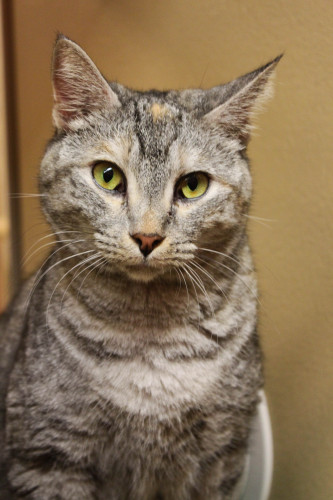6 Things Your VET Wants To Tell You
by Remy Sheppard
(North Carolina, US)

There is this sort of cultural "meme" that cats are independent. A lot of us have this idea that the cat is okay as long as the cat is acting okay, but that isn't always true.
As a cat owner, you are responsible for the animal's health and welfare. One could argue that you're more responsible for the cat than it is for itself simply because you know better. There is a lot more to caring for a cat than just owning it and feeding it. In fact, here’s a list of things that your vet may be too polite to tell you.
You should be touching every part of your cat every single day. At least once a day you need to run your hands over your cat's entire body. Every single square inch of skin needs to be touched consciously by you every day.
The goal is to find tumors and growths before they get too big. Cat’s fur can obscure growths and tumors for a very long time, and by the time they become easily visible to the naked eye, they are much harder to deal with.
Make sure you rub your cat down thoroughly each day to check for growths. You can incorporate this into petting and playtime, just make sure it happens daily. Growths, especially cancerous ones, can come on fast and out of nowhere, and the earlier you can catch them the better.
You need to look at your cat's teeth frequently.
Bad teeth can lead to a host of illnesses, as the teeth will develop grime that can trap and grow harmful bacteria.
At least once a week you need to check the cat's teeth by gently lifting the lips in the front and on both sides. Also make sure you open your cat's mouth and check the inside of their teeth.
While you have their mouth open, look around for growths, sores, or odd coloration, as these are common ways that cancer can present in cats. Cats tend to be very susceptible to mouth, throat, and nose cancers, so make sure you pay attention to this.
You don't need a license to palpate your cat.
It's not hard to palpate a cat. You firmly (but gently) use your fingertips to press on their stomach below the ribs and down the pelvis.
This is most effective when the cat is standing, not lying on their back.
As you do this pay attention to what you're feeling. You should be able to feel the bladder, the liver, and you'll feel the intestines squirm a bit away from you. You may worry this is painful to the cat, it isn't. You aren't pushing very hard or very far. Just gently depress the skin around the tummy so you can feel what's going on in there.
You’ve probably seen your vet do this (if you haven’t, you need a new vet). Just do what they did. The more you do this, the more you’ll learn what your cat should feel like.
Palpating your cat regularly can alert you to any growths or irregularities internally in the cat. It's much better to catch these things early than it is to wait for your once or twice a year exam.
You waited too long to ask for help.
Too many people Google cat behavioral issues first, and don’t go to a vet until they’ve exhausted all of the “cheaper” options. That’s understandable, we all have a budget that we’re trying to live within, but behavioral issues in cats usually bely a worse issue.
Cats tend to act out behaviorally when they aren’t feeling well. If your cat starts acting strangely, is more aggressive than usual, or starts doing things like eliminating outside of the litter box, your first stop needs to be the vet’s office.
Aggressive or strange behavior can be neurological or the result of a pathogen or parasite.
Eliminating outside the litter box could be as simple as a urinary tract infection or as serious as a cancer in the bladder.
Lethargic or reclusive behavior could denote problems with the liver, including failure.
I’m not trying to scare you, and I’m not saying that every mood swing or behavioral affectation of your cat is a sign that it’s dying. In fact, medical issues might rarely be to blame, but there is always the potential.
Most people don’t take that potential as seriously as they should, and they think that the cat peeing outside of the litter box is just weird behavior. Then they end up waiting too long and the real problem has become gravely serious.
Always assume and start with medical options first, then move on to other remedies once health issues have been ruled out by a professional.
You can brush your cat’s teeth
Your cat will hate this. I can promise you. But dental health, as we stated earlier, is very important. If you neglect your cat’s dental health, they could be at risk to lose their teeth or need them removed.
Brushing your baby’s teeth is easiest with a partner who can hold the cat still. If you’re going to try to do this by yourself, then I suggest you wrap your cat up in a kitty burrito so they’re nice and snug.
All you have to do is get a damp paper towel and very gently wipe down your cat’s teeth. Pay special attention to the rear teeth as these are often the dirtiest. You don’t need to scrub or use any kind of solution.
Just make sure you gently wipe away any plaque or build up on your cat’s teeth. You’ll know it because it’s thicker, and usually differently colored than the teeth themselves.
Do you check your cat’s ears regularly?
This is more for you folks with outdoor cats. Every few days, take a second to peer inside your cat’s ears. Just gently pull them back and take a look.
Never, ever attempt to dig in or clean out your cat’s ears. All you ever want to do is look.
You’re looking for thick black build up, anything moving, or what may look like flea dirt. Cats are very good at keeping their ears nice and clean.
Dirty ears can be a sign of ear mites, fleas, or other parasites.
You also want to make sure that the ears aren’t swollen or red inside, as this may be a sign of infection.
If you notice anything that seems off with your cat’s ears, make sure you call your vet right away. Inflamed, infected, or otherwise infested ears in a cat can result in clumsiness and a loss of balance, and stress from reduced hearing.
Cats rely on their ears for a lot of things, so you need to make sure they’re tip-top!
I hope that, as a cat owner, you found this article beneficial and insightful. Here’s to many years of health and love between you and your kitty cat!
Remy Sheppard and his wife Samantha are proud fur-parents to their beautiful American Shorthair Gabby, and together run her Instagram (https://www.instagram.com/gabby.the.tabby).
Healthy Cat Treat

Subscribe to Our Love Cats Digest e-zine
"A cat improves the garden wall in sunshine, and the hearth in foul weather." - Judith Merkle Riley
Marketing Strategies by
















